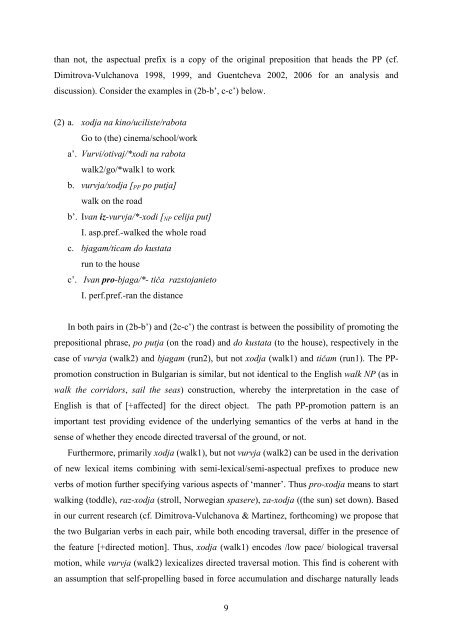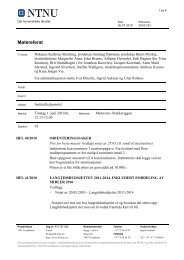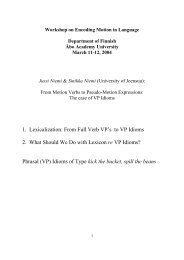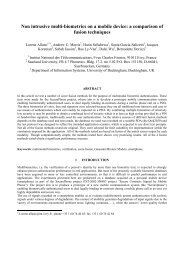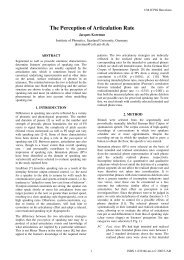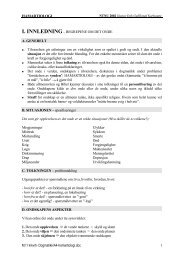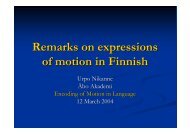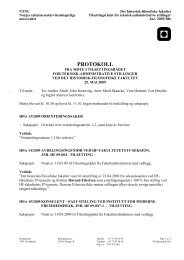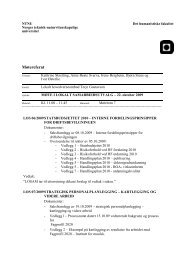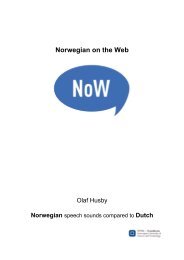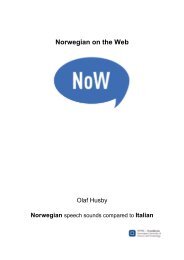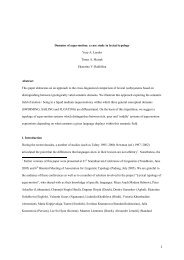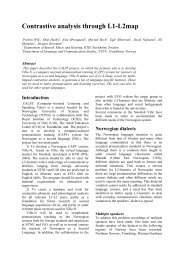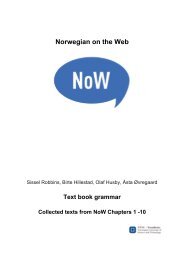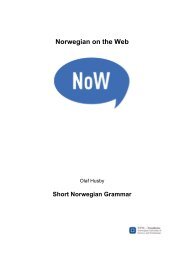In press: In: Dimitrova-Vulchanova, M - NTNU
In press: In: Dimitrova-Vulchanova, M - NTNU
In press: In: Dimitrova-Vulchanova, M - NTNU
You also want an ePaper? Increase the reach of your titles
YUMPU automatically turns print PDFs into web optimized ePapers that Google loves.
than not, the aspectual prefix is a copy of the original preposition that heads the PP (cf.<br />
<strong>Dimitrova</strong>-<strong>Vulchanova</strong> 1998, 1999, and Guentcheva 2002, 2006 for an analysis and<br />
discussion). Consider the examples in (2b-b’, c-c’) below.<br />
(2) a. xodja na kino/uciliste/rabota<br />
Go to (the) cinema/school/work<br />
a’. Vurvi/otivaj/*xodi na rabota<br />
walk2/go/*walk1 to work<br />
b. vurvja/xodja [ PP po putja]<br />
walk on the road<br />
b’. Ivan iz-vurvja/*-xodi [ NP celija put]<br />
I. asp.pref.-walked the whole road<br />
c. bjagam/ticam do kustata<br />
run to the house<br />
c’. Ivan pro-bjaga/*- tiča razstojanieto<br />
I. perf.pref.-ran the distance<br />
<strong>In</strong> both pairs in (2b-b’) and (2c-c’) the contrast is between the possibility of promoting the<br />
prepositional phrase, po putja (on the road) and do kustata (to the house), respectively in the<br />
case of vurvja (walk2) and bjagam (run2), but not xodja (walk1) and tičam (run1). The PPpromotion<br />
construction in Bulgarian is similar, but not identical to the English walk NP (as in<br />
walk the corridors, sail the seas) construction, whereby the interpretation in the case of<br />
English is that of [+affected] for the direct object. The path PP-promotion pattern is an<br />
important test providing evidence of the underlying semantics of the verbs at hand in the<br />
sense of whether they encode directed traversal of the ground, or not.<br />
Furthermore, primarily xodja (walk1), but not vurvja (walk2) can be used in the derivation<br />
of new lexical items combining with semi-lexical/semi-aspectual prefixes to produce new<br />
verbs of motion further specifying various aspects of ‘manner’. Thus pro-xodja means to start<br />
walking (toddle), raz-xodja (stroll, Norwegian spasere), za-xodja ((the sun) set down). Based<br />
in our current research (cf. <strong>Dimitrova</strong>-<strong>Vulchanova</strong> & Martinez, forthcoming) we propose that<br />
the two Bulgarian verbs in each pair, while both encoding traversal, differ in the presence of<br />
the feature [+directed motion]. Thus, xodja (walk1) encodes /low pace/ biological traversal<br />
motion, while vurvja (walk2) lexicalizes directed traversal motion. This find is coherent with<br />
an assumption that self-propelling based in force accumulation and discharge naturally leads<br />
9


